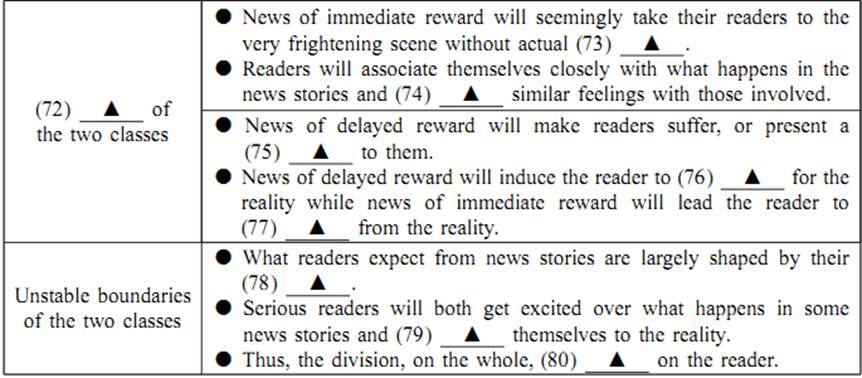微信搜索关注"91考试网"公众号,领30元,获取公务员、事业编、教师等考试资料40G!
hat Freud calls the Pleasure Principle, the other to what he calls the Reality Principle. For want of better names, we shall call these two classes immediate reward and delayed reward.
In general, the kind of news which may be expected to give immediate reward are news of crime and corruption, accidents and disasters, sports, social events, and human interest. Delayed reward may be expected from news of public affairs, economic matters, social problems, science, education, and health.
News of the first kind pays its rewards at once. A reader can enjoy an indirect experience without any of the dangers or stresses involved. He can tremble wildly at an axe-murder, shake his head sympathetically and safely at a hurricane, identify himself with the winning team, laugh understandingly at a warm little story of children or dogs.
News of the second kind, however, pays its rewards later. It sometimes requires the reader to tolerate unpleasantness or annoyance—as, for example, when he reads of the threatening foreign situation, the mounting national debt, rising taxes, falling market, scarce housing, and cancer. It has
a kind of “threat value.” It is read so that the reader may be informed and prepared. When a reader selects delayed reward news, he pulls himself into the world of surrounding reality to which he can adapt himself only by hard work. When he selects news of the other kind, he usually withdraws from the world of threatening reality toward the dream world.
For any individual, of course, the boundaries of these two classes are not stable. For example, a sociologist may read news of crime as a social problem, rather than for its immediate reward. A coach may read a sports story for its threat value: he may have to play that team next week. A politician may read an account of his latest successful public meeting, not for its delayed reward, but very much as his wife reads an account of a party. In any given story of corruption or disaster, a thoughtful reader may receive not only the immediate reward of indirect experience, but also the delayed reward of information and preparedness. Therefore, while the division of categories holds in general, an individual’s tendency may transfer any story from one kind of reading to another, or divide the experience between the two kinds of reward.


第五部分:书面表达(满分25分)
81. 请阅读下面文字及图表,并按照要求用英语写一篇150 词左右的文章。

【写作内容】
1. 用约30 个单词概述上述信息的主要内容;
2. 结合上述信息,简要分析导致交通问题的主要原因;
3. 根据你的分析,从社会规范(rules and regulations)和个人行为两方面谈谈你得到的启示(不少两点)。
【写作要求】
1. 写作过程中不能直接引用原文语句; 2. 作文中不能出现真实姓名和学校名称;
3. 不必写标题。
【评分标准】
内容完整,语言规范,语篇连贯,词数适当。
英语试题参考答案
第一部分(共20 小题;每小题1 分,共20 分)
1. A 2. C 3. A 4. B 5. C 6. B 7. A 8. B 9. C 10. B
11. A 12. B 13. C 14. A 15. B 16. C 17. B 18. A 19. A 20. C
— 14 —
----------------------- Page 16-----------------------